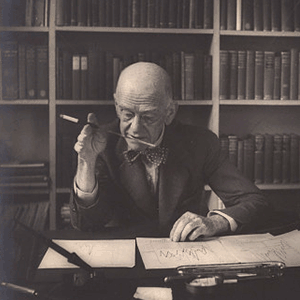 Elton Mayo was born in Adelaide, South Australia on 26 December 1880 and died in Guildford, Surrey on 1 September 1949. He was the second child of a respected colonial family. Elton was expected to follow his grandfather into medicine, but failed at university studies and was sent to Britain. Here he turned to writing, wrote on Australian politics for the Pall Mall Gazette and started teaching. He then returned to Australia to work in an Adelaide publishing business where his views on management caused him to be unpopular. He went back to study, and became the most brilliant student of the philosopher Sir William Mitchell.
Elton Mayo was born in Adelaide, South Australia on 26 December 1880 and died in Guildford, Surrey on 1 September 1949. He was the second child of a respected colonial family. Elton was expected to follow his grandfather into medicine, but failed at university studies and was sent to Britain. Here he turned to writing, wrote on Australian politics for the Pall Mall Gazette and started teaching. He then returned to Australia to work in an Adelaide publishing business where his views on management caused him to be unpopular. He went back to study, and became the most brilliant student of the philosopher Sir William Mitchell.
During a successful academic career in Australia he went on secondment to Britain but got ‘stuck’ in the USA on a series of speaking engagements and working on a number of projects. When the University refused to renew the secondment he ended up without a source of funds. He got an offer of financial support for six months from the philanthropist John D. Rockefeller, and was given a temporary post at the University of Pennsylvania in 1923.
He researched the effect of rest breaks on worker productivity in various textile firms. In one study he introduced regular pauses from the back-breaking work of a cotton-spinning mill and observed improvements in worker productivity. The rest breaks were opposed by the foremen who, when Mayo was absent from the plant, returned workers to past practices. The effect of their intervention was a dramatic fall in productivity, thus illustrating the effectiveness of Mayo’s rest pauses.
Mayo went on to his most famous experiments – those at the Hawthorne Works of the General Electric Company in Chicago between 1924 and 1927. He undertook further experimentation to find out what effect fatigue and monotony had on job productivity and how to control them through varying rest breaks, work hours, temperature and humidity.
Mayo realised that the women, exercising a freedom they didn’t have on the factory floor, had formed a social group that also included the observer who tracked their productivity. The talked and they joked. They began to meet socially outside of work. Mayo had discovered a fundamental concept that seems obvious today. Workplaces are social environments and within them, people are motivated by much more than economic self-interest. Mayo realised that the very fact that people were taking an interest in the workers was affecting their behaviour and their productivity – and, even when the changes made were, at face value, negative (such as shortening rest breaks or lowering lighting levels) productivity rose. His findings didn’t mesh with the then current theory (see F.W. Taylor) of the worker as motivated solely by self-interest but Mayo had stumbled upon a principle of human motivation that revolutionised the theory and practice of management.
He concluded that :
- Work is a group activity
- The need for recognition, security and sense of belonging is more important in determining workers’ morale and productivity than the physical conditions under which he works.
- Informal groups within the work plant exercise strong social controls over the work habits and attitudes of the individual worker.
